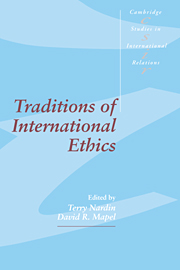Book contents
- Frontmatter
- Contents
- Contributors
- Preface
- 1 ETHICAL TRADITIONS IN INTERNATIONAL AFFAIRS
- 2 THE TRADITION OF INTERNATIONAL LAW
- 3 THE DECLARATORY TRADITION IN MODERN INTERNATIONAL LAW
- 4 CLASSICAL REALISM
- 5 TWENTIETH-CENTURY REALISM
- 6 NATURAL LAW AND INTERNATIONAL ETHICS
- 7 KANT'S GLOBAL RATIONALISM
- 8 UTILITARIANISM AND INTERNATIONAL ETHICS
- 9 THE CONTRACTARIAN TRADITION AND INTERNATIONAL ETHICS
- 10 LIBERALISM AND INTERNATIONAL REFORM
- 11 MARXISM AND INTERNATIONAL ETHICS
- 12 THE IDEA OF RIGHTS IN INTERNATIONAL ETHICS
- 13 BIBLICAL ARGUMENT IN INTERNATIONAL ETHICS
- 14 CONVERGENCE AND DIVERGENCE IN INTERNATIONAL ETHICS
- Index
- Titles in the series
3 - THE DECLARATORY TRADITION IN MODERN INTERNATIONAL LAW
Published online by Cambridge University Press: 15 September 2009
- Frontmatter
- Contents
- Contributors
- Preface
- 1 ETHICAL TRADITIONS IN INTERNATIONAL AFFAIRS
- 2 THE TRADITION OF INTERNATIONAL LAW
- 3 THE DECLARATORY TRADITION IN MODERN INTERNATIONAL LAW
- 4 CLASSICAL REALISM
- 5 TWENTIETH-CENTURY REALISM
- 6 NATURAL LAW AND INTERNATIONAL ETHICS
- 7 KANT'S GLOBAL RATIONALISM
- 8 UTILITARIANISM AND INTERNATIONAL ETHICS
- 9 THE CONTRACTARIAN TRADITION AND INTERNATIONAL ETHICS
- 10 LIBERALISM AND INTERNATIONAL REFORM
- 11 MARXISM AND INTERNATIONAL ETHICS
- 12 THE IDEA OF RIGHTS IN INTERNATIONAL ETHICS
- 13 BIBLICAL ARGUMENT IN INTERNATIONAL ETHICS
- 14 CONVERGENCE AND DIVERGENCE IN INTERNATIONAL ETHICS
- Index
- Titles in the series
Summary
In recent times, the states of the international system have taken an increasingly active role in articulating and shaping a declaratory tradition in international law. They have always been involved, of course, in creating the whole body of the law, both written and customary. The nature and extent of their involvement has, however, changed in the modern period, a change that can be dated from about the end of the First World War. In the past, as Murray Forsyth shows in Chapter 2, international law has been the product of a complex interaction between theory and practice, with the states' actions providing the body of practice on which jurists, political theorists, and moral philosophers have reflected. These reflections and comments have, in turn, affected the practice of states by influencing the conceptions of leaders and policymakers as to what actions were possible and proper. In this process, states have generally been content to pursue their national goals and let others articulate the principles on which they were acting or were supposed to act.
After the First World War this situation changed, and it has been changing at an increasing rate ever since. Through their political leaders, foreign-service officers, and delegates to international bodies, the states have begun to reflect upon their own behavior, and have become major contributors to the explication of international law.
- Type
- Chapter
- Information
- Traditions of International Ethics , pp. 42 - 61Publisher: Cambridge University PressPrint publication year: 1992
- 6
- Cited by



